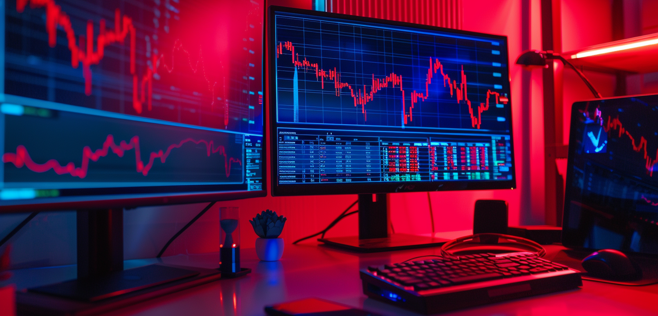 11 Nov 2024
11 Nov 2024The Psychology of Crypto Trading: How to Stay Calm and Profitable

Crypto trading is a fast-paced, high-stakes endeavor that requires more than just technical knowledge and market analysis. The intense volatility of cryptocurrency markets, combined with the potential for quick gains and losses, can make trading a highly emotional experience. Traders often face a whirlwind of emotions, from the thrill of a profitable trade to the anxiety of watching prices drop unexpectedly. These emotional swings can lead to impulsive decisions, potentially resulting in significant financial losses.
A stable mindset is essential for long-term success in crypto trading. Developing emotional resilience and discipline allows traders to make objective decisions, unaffected by the highs and lows of the market. Those who can maintain a calm and balanced approach are more likely to execute their strategies effectively and avoid costly mistakes.

Emotional Rollercoaster: Navigating the Challenges of Crypto Market Volatility
Crypto markets are known for their extreme volatility, with prices often fluctuating dramatically within minutes. Unlike traditional markets, cryptocurrency operates around the clock, with no “off hours” to cool down and reflect. This constant movement creates both opportunities and stress for traders, amplifying the psychological pressures involved. The rapid pace of change can leave traders on edge, as they try to capture gains and avoid losses amidst sudden price swings.
Common Emotional Reactions in Crypto Trading
Due to this volatility, crypto traders frequently experience intense emotions such as:
- Fear
The fear of losing money can cause traders to exit positions prematurely, even if their analysis suggests that holding might be the wiser choice. Fear is especially common after recent losses or during market downturns.
- Greed
The allure of significant profits can drive traders to take larger, riskier positions than they initially planned. Greed often blinds traders to the risks involved, leading them to chase gains at the expense of careful analysis.
- FOMO (Fear of Missing Out)
Seeing others make quick gains can lead to FOMO, a powerful emotion that tempts traders to enter positions impulsively, often at the worst times. FOMO is frequently triggered by news of a sharp price increase or hype around a particular asset.
- Panic
When the market moves sharply in an unexpected direction, panic can set in. This emotional reaction often results in traders abandoning their strategies and selling at a loss to avoid further declines, only to regret the decision later.
How Emotional Reactions Lead to Impulsive Decisions
These emotional responses, while natural, can drive traders to make irrational and impulsive choices. For instance, fear can prevent traders from holding onto potentially profitable positions, while greed may prompt them to hold onto losing ones, hoping for a turnaround. FOMO and panic can push traders to act hastily without sufficient analysis, leading to buying at market peaks or selling during dips.
In the unpredictable world of crypto, managing these emotions is essential to avoid impulsive, unprofitable decisions. Building emotional resilience and developing strategies to counter these reactions can help traders navigate market volatility with a clearer mind and a more strategic approach.

The Importance of Developing a Resilient Trading Mindset
In crypto trading, where volatility and uncertainty are the norm, a resilient trading mindset is critical for achieving long-term success. A strong mindset enables traders to stay grounded, manage their emotional responses, and make decisions based on analysis rather than impulsive reactions. Developing this mental strength can be the difference between consistently profitable trading and a cycle of gains and losses.
Defining a Resilient Trading Mindset and Why It’s Essential
A resilient trading mindset is characterized by the ability to withstand market fluctuations and maintain emotional control regardless of short-term outcomes. This mindset helps traders stay focused on their strategies and goals, rather than being swayed by immediate gains or losses. Building resilience allows traders to view each trade as part of a larger journey, reducing the impact of any one outcome on their overall perspective.
Long-term success in crypto trading relies heavily on discipline and emotional fortitude. By fostering resilience, traders can prevent fear, greed, and FOMO from dictating their actions, thereby reducing the likelihood of impulsive, high-risk decisions.
Key Characteristics of a Disciplined Trader: Patience, Focus, and Objectivity
A disciplined trader embodies several key traits that contribute to successful trading:
- Patience
Crypto trading often involves waiting for the right market conditions to enter or exit a position. Patience allows traders to avoid hasty decisions, enabling them to wait for high-probability setups and avoid unnecessary risks.
- Focus
Staying focused is crucial in the face of market distractions and external noise. Traders who maintain a clear focus on their strategy and goals are less likely to be affected by short-term fluctuations or hype-driven moves.
- Objectivity
Objectivity enables traders to analyze the market without emotional bias. By staying neutral and evaluating positions based on data rather than emotions, traders can make more rational and profitable decisions.
Shifting from an Outcome-Based Mindset to a Process-Oriented Mindset
Many traders enter the market with an outcome-based mindset, focusing on profits or losses as the primary measure of success. However, this approach can lead to anxiety and stress, as each trade feels like a critical moment. Instead, successful traders adopt a process-oriented mindset, where the focus is on consistently following their strategy, managing risk, and making sound decisions.
By prioritizing the process over the outcome, traders become less affected by short-term results and more invested in refining their approach. This shift helps build resilience and creates a foundation for sustainable, long-term success in the crypto market. Developing a resilient trading mindset, characterized by patience, focus, and objectivity, enables traders to navigate the ups and downs of the market with confidence and consistency.

Strategies to Stay Calm and Focused in Volatile Markets
Navigating the volatility of crypto markets requires a set of strategies that can help traders stay grounded, make rational decisions, and manage risk effectively. By implementing these methods, traders can reduce emotional responses and enhance their ability to execute consistent, profitable trades.
Setting Clear Goals and Limits
One of the most effective ways to manage emotional reactions is to set clear trading goals and limits. Before entering any trade, traders should define their risk tolerance, position sizes, and profit targets. This clarity prevents traders from taking unnecessary risks and helps them stick to their strategy, regardless of market fluctuations.
- Defining Goals
Having specific goals, such as a target return or percentage gain, helps traders remain focused and avoid overtrading.
- Risk Tolerance
Setting limits on the amount of capital that can be risked per trade, based on one’s financial situation and comfort level, prevents excessive losses.
- Position Sizing
Proper position sizing aligns trades with overall portfolio goals and risk tolerance, helping to avoid outsized risks.
Using Stop-Loss and Take-Profit Orders
Stop-loss and take-profit orders are essential tools for maintaining control over trades. By automating exits at pre-determined price levels, traders can manage their risk without making spur-of-the-moment decisions. These orders help traders protect their capital, secure profits, and stay calm by reducing the need for constant monitoring.
- Stop-Loss Orders
A stop-loss order automatically closes a trade if the asset’s price reaches a specific downside threshold, limiting losses.
- Take-Profit Orders
A take-profit order exits a trade once a certain profit target is reached, ensuring gains without the temptation to hold for potentially higher returns.
By setting these orders, traders can stick to their plans and avoid the stress that often comes with real-time decision-making during volatile conditions.
Practicing Mindfulness and Stress Management Techniques
Mindfulness and stress management techniques can play a vital role in keeping traders calm and focused. Practicing mindfulness through meditation, deep breathing exercises, or simply taking breaks during the trading day can help manage stress and reduce anxiety.
- Meditation
Regular meditation can improve focus and emotional regulation, making it easier to manage stressful moments in the market.
- Breathing Exercises
Simple breathing exercises can quickly calm the mind, helping traders regain clarity during periods of heightened market volatility.
Incorporating these techniques into a daily routine can help traders build a more balanced mindset, improving their ability to handle market stress.
Establishing a Trading Routine
A structured trading routine is a powerful way to reduce impulsive actions and improve discipline. Establishing a consistent routine, such as dedicating specific hours for research, analysis, and trading, can help traders approach the market with greater focus and intention.
- Consistent Analysis and Review
Setting aside time for market analysis and post-trade reviews can improve decision-making and reduce emotional trading.
- Routine Breaks
Including regular breaks in the trading schedule helps prevent burnout and refreshes mental focus.
By following a structured routine, traders can approach each day with a clear plan, minimizing the impact of market fluctuations on their emotions.
Implementing these strategies not only helps traders stay calm and focused but also enhances their ability to make rational, objective decisions. In a volatile market like crypto, maintaining emotional control through goal-setting, automated risk management, mindfulness, and routine can be instrumental in achieving consistent profitability and long-term success.

Building Emotional Resilience and Avoiding Common Pitfalls
Emotional resilience is essential for successful crypto trading, helping traders weather the inevitable ups and downs without compromising their strategies. By understanding and addressing common emotional pitfalls, traders can strengthen their mental approach and improve long-term performance.
Accepting Losses as Part of the Process
In trading, losses are a natural part of the journey. No strategy is flawless, and even the most experienced traders encounter losses. Accepting this reality is a crucial step toward emotional resilience. Viewing losses as learning opportunities rather than personal failures allows traders to move forward without letting negative emotions impact their future decisions.
- Shifting Perspective
Instead of dwelling on losses, traders can focus on analyzing what went wrong and using that knowledge to refine their strategies.
- Learning to Let Go
Recognizing that each trade is independent can prevent traders from letting one loss influence the next decision, helping them stay objective and consistent.
Combating FOMO and Greed
FOMO (Fear of Missing Out) and greed are two of the most common emotions that can derail a trader’s strategy. These emotions often lead to impulsive decisions, like chasing after a rapidly rising asset or taking excessive risk in the hopes of quick gains. By acknowledging these feelings, traders can put strategies in place to manage them effectively.
- Setting Boundaries
Establishing clear entry and exit points based on research and sticking to them helps prevent impulsive reactions driven by FOMO.
- Practicing Discipline
Traders can avoid overextending themselves by focusing on their goals and risk tolerance rather than trying to chase the latest trends.
Using Journaling for Self-Reflection
A trading journal is a valuable tool for developing self-awareness and identifying emotional patterns. By recording each trade, along with thoughts and emotions before, during, and after the trade, traders can gain insight into their psychological tendencies. This practice helps them spot recurring behaviors, such as reacting emotionally to losses or falling prey to FOMO, and work toward minimizing these tendencies.
- Tracking Emotional Reactions
Recording how emotions influence trades provides a clearer understanding of where improvements are needed.
- Identifying Patterns
By reviewing past trades, traders can identify patterns in their behavior, such as specific situations that trigger FOMO or fear, and develop strategies to manage these triggers.
Building emotional resilience takes time and consistent effort, but it is a key factor in successful trading. By accepting losses, managing FOMO and greed, and using self-reflection through journaling, traders can better navigate the emotional challenges of the crypto market. Strengthening these skills enables traders to stay focused on their strategies, improving both their confidence and their long-term results.

Practical Tools and Resources for Managing Trading Psychology
Effectively managing trading psychology requires the right tools and resources to build emotional resilience and maintain a balanced mindset. By leveraging educational materials, stress-management tools, and supportive communities, traders can better equip themselves to handle the emotional demands of crypto trading.
Educational Resources on Trading Psychology
Understanding trading psychology is a foundational step in developing emotional control. A wealth of educational resources, including books, courses, and articles, is available to help traders build these essential skills. Here are some popular options:
- Books
Classics like "Trading for a Living" by Dr. Alexander Elder and "The Disciplined Trader" by Mark Douglas offer insights into managing emotions, maintaining discipline, and making objective decisions.
- Online Courses
Many platforms offer courses focused on trading psychology, covering topics like mindset, risk management, and developing trading discipline.
- Articles and Blogs
Reputable trading websites and blogs frequently publish articles on the psychological aspects of trading, providing accessible advice and strategies for maintaining emotional balance.
These resources help traders understand the psychology behind their decisions and offer actionable advice for cultivating a more disciplined approach.
Apps for Mindfulness and Stress Reduction
Stress management is crucial for maintaining focus in the fast-paced world of crypto trading. Mindfulness and stress reduction apps can help traders manage anxiety, improve concentration, and maintain calm during volatile market conditions. Here are some recommended apps:
- Headspace
A leading mindfulness app, Headspace offers guided meditation, breathing exercises, and stress management techniques that can help traders stay calm and centered.
- Calm
This app provides meditation, sleep aids, and relaxation exercises to help traders reduce stress and focus more effectively during trading hours.
- Insight Timer
Known for its extensive library of free guided meditations and mindfulness exercises, Insight Timer offers resources tailored to managing stress and building mental clarity.
By incorporating these tools into their daily routines, traders can reduce stress and approach their trading sessions with a more balanced, focused mindset.
Community Support and Mentorship
Trading can be an isolating experience, but connecting with other traders provides valuable support and perspective. Communities and mentorships can offer traders the chance to share experiences, learn from others’ successes and challenges, and receive constructive feedback.
- Online Communities
Platforms like Reddit’s r/CryptoMarkets, trading forums, and Discord channels dedicated to crypto trading allow traders to connect, discuss strategies, and seek advice in real-time.
- Mentorship Programs
Many experienced traders offer mentorships, either individually or through organized programs. Having a mentor can provide personalized guidance and help traders stay accountable to their goals.
- Social Media Groups
Facebook and LinkedIn groups, along with Twitter trading communities, enable traders to follow expert insights and engage with others who share similar interests.
These communities provide not only trading insights but also emotional support and camaraderie, reminding traders that they’re not alone in facing the market’s challenges.
Using these tools and resources, traders can cultivate the mindset and emotional resilience necessary for navigating the highs and lows of crypto trading. With the right support and resources, traders can better manage their psychological well-being, allowing them to trade with more confidence and consistency.

Long-Term Mental Habits for Sustainable Trading Success
Building long-term success in crypto trading requires not only technical skills but also mental habits that foster resilience and adaptability. By developing habits such as patience, flexibility, and self-assessment, traders can maintain their edge and thrive in the ever-evolving crypto market.
Practicing Patience and Delayed Gratification
Patience is a crucial habit for effective trading, as it allows traders to make thoughtful decisions rather than impulsive ones. In the volatile world of crypto, it can be tempting to act on every price movement or jump into trades based on short-term excitement. However, by practicing delayed gratification, traders can improve their decision-making and wait for high-probability setups rather than forcing trades.
- Delayed Gratification
Choosing to hold off on impulsive trades in favor of waiting for the right opportunities strengthens discipline and helps traders avoid unnecessary losses.
- Improved Decision-Making
Patience allows traders to analyze trades more objectively, reducing the likelihood of reacting emotionally to market fluctuations.
Learning to Adapt and Stay Flexible
The crypto market is constantly changing, and strategies that work well in one market environment may not be effective in another. Traders who succeed in the long term understand the importance of flexibility and the need to adapt to new trends and market conditions.
- Embracing Change
Accepting that the market will not always behave predictably helps traders adjust their strategies and remain open to learning.
- Updating Strategies
Regularly reviewing and refining trading strategies based on market conditions allows traders to stay relevant and make informed adjustments as necessary.
By fostering a mindset of adaptability, traders are better equipped to handle shifts in market sentiment, emerging technologies, and regulatory changes, which are all common in the cryptocurrency space.
Continuously Evaluating and Improving
The most successful traders commit to a journey of constant self-assessment and improvement. Regularly reviewing trading decisions, identifying areas for growth, and staying informed on new strategies and market insights help traders maintain their edge.
- Self-Assessment
Traders should routinely evaluate their performance, considering both successful and unsuccessful trades, to identify strengths and areas for improvement.
- Continuous Learning
The crypto market is evolving quickly, and ongoing education in both technical skills and trading psychology is essential for sustained success.
This commitment to growth helps traders refine their approach, adapt to market changes, and continually build upon their strengths.
Developing these long-term mental habits — patience, flexibility, and self-improvement — lays a strong foundation for sustainable success in crypto trading. By incorporating these practices, traders can navigate market challenges more effectively, improve their decision-making, and set themselves up for consistent profitability over time.

Conclusion
Long-term success in crypto trading requires a commitment to building emotional resilience and cultivating mental habits like patience, adaptability, and continuous self-improvement. Discipline is key in the ever-fluctuating crypto market, helping traders stick to their strategies and manage risk effectively.
By developing a balanced approach that combines technical skills with psychological resilience, traders can navigate the highs and lows of the crypto market more confidently. Embracing these mental habits and strategies not only helps improve profitability but also makes the trading journey a more sustainable and rewarding experience.

 Get RateX Pro
Get RateX Pro
 06 Jun 2024
06 Jun 2024



